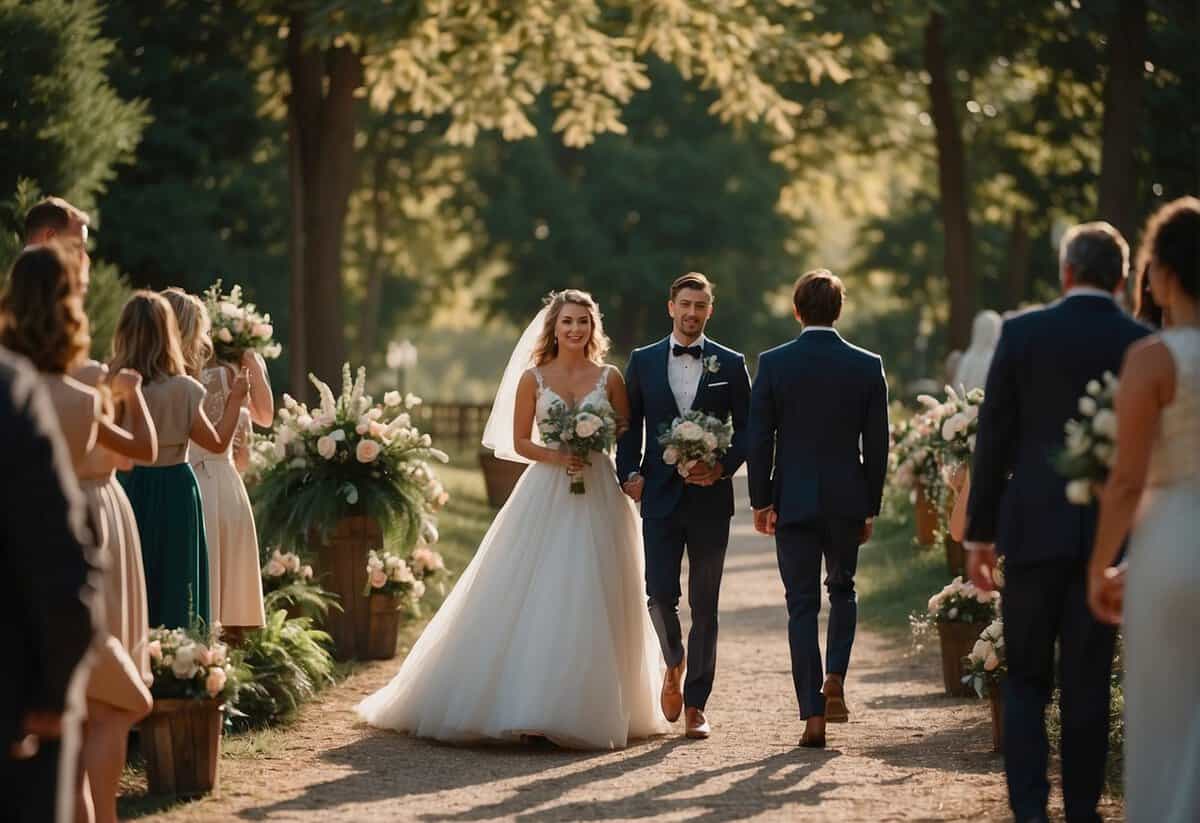What is the Difference Between Eloping and a Wedding? Understanding Ceremony Choices
When considering the celebration of your union, you might ponder whether to have a traditional wedding or opt for an elopement. While both are joyful expressions of love, they are marked by distinct differences. A traditional wedding typically involves a more extensive guest list, formal ceremonies, and is often larger in scale, aligning with long-held customs and societal expectations. It can be a grand event that brings together family and friends in a celebration that includes many details to manage.

In contrast, eloping is an intimate affair where the focus is squarely on the couple. It can happen almost anywhere, from a local courthouse to a breathtaking mountaintop, and generally involves fewer guests, which may include just the couple themselves. The planning for an elopement is usually less complex and can be more flexible, allowing for a personal and authentic experience that resonates with the couple’s unique story. The simplicity of eloping often results in fewer logistical demands and may also have a reduced financial impact compared to a traditional wedding.
Key Takeaways
- A traditional wedding is usually a large-scale event with many guests, while an elopement is an intimate affair.
- Elopements typically involve simpler planning and can be more personal and flexible.
- Both elopement and traditional weddings celebrate the couple’s love but differ in scale, planning, and guest involvement.
Understanding Wedding and Elopement

When you’re planning your special day, understanding the distinction between a traditional wedding and an elopement can help guide your decision. Let’s explore the nuances of each to find what best suits your vision.
Defining Wedding and Elopement
Traditional Wedding:
This is an event that typically involves a ceremony where you exchange vows in the presence of a larger gathering that can include anywhere from 50 to over 200 guests. The occasion is often marked with extensive planning, significant costs, and adherence to certain traditions. It’s a celebration of love that includes family and friends in a significant way.
Elopement:
On the other hand, an elopement is a marriage conducted in a more intimate setting, often with no guests or a small group of up to 20 people. It’s characterized by its simplicity, flexibility, and a strong focus on the personal bond between you and your partner. An elopement can take place in a variety of locations, emphasizing the experience over the formalities of a larger wedding.
Historical and Cultural Contexts
Traditional Weddings:
Historically, weddings have been grand affairs to not only celebrate the union of two individuals but also to form alliances between families. These ceremonies often come with deep-rooted traditions that reflect your cultural or religious heritage.
Elopements:
Contrastingly, eloping has traditionally been seen as a way to forego these societal expectations. It was sometimes associated with secrecy or a rushed union. However, modern elopements have shed this connotation and are now often seen as a way to personalize your commitment to each other, sometimes even blending in elements of traditional ceremonies on a smaller scale.
Choose your path based on what resonates with you and your partner: the inclusive celebration of a traditional wedding or the intimate, personalized experience of an elopement.
Planning Your Special Day

When you’re outlining your special day, you’ll want to focus on where you’ll exchange vows, who you’ll share the moment with, and how you’re going to finance this milestone. These are key components that’ll shape your celebration.
Choosing the Venue and Location
Selecting the right venue and location is pivotal for your wedding or elopement. It sets the ambiance for your ceremony and can range from a local wedding venue to an exotic destination far from home. If you’re eloping, think about spots that resonate with you as a couple, such as getting married amidst nature or in a quaint courthouse. For traditional weddings, consider if you want a formal venue or a more relaxed setting.
Deciding the Guest List and Size
Your guest list will significantly impact the dynamics of your day. An elopement typically involves just the couple or a handful of guests, making it a very intimate affair. For a larger wedding, you’ll need to think about whether to invite distant relatives and acquaintances. It’s essential to decide early on whether to keep things small or to plan for a more significant event, as this will affect other planning aspects like invites and seating arrangements.
Evaluating Costs and Budgeting
Budgeting for your celebration requires a clear view of your finances. Elopements often incur lower costs, with expenses like the officiant, attire, and possibly a few other items like photography. Traditional weddings include these plus the cost of wedding planners, caterers, entertainment, and a honeymoon. Remember to allocate funds for potential venue deposits and decide if you need a wedding planner to help manage your wedding budget.
Crafting the day you’ve envisioned means keeping these details in check to ensure a celebration that’s true to you and your partner. Remember, whether an intimate elopement or a grand wedding, what matters most is that it reflects your unique bond.
The Experience and Celebration

When deciding between eloping and having a traditional wedding, you’re choosing between distinctly different experiences. The focus on personalization and incorporating either traditions or non-traditional elements will shape your celebration in unique ways.
Personalization and Authentic Moments
Eloping typically allows you more freedom to personalize your special day. Without the bounds of traditional wedding expectations, you can focus on creating a celebration that truly reflects your love as a couple. For instance, your vows can be exchanged on a secluded mountaintop or beside an intimate seaside setting. Eloping encourages moments that feel authentic and centered on your connection, rather than on orchestrating a large-scale event.
- Décor: choose items that have meaningful significance to you both.
- Menu: tailor your dining experience to your tastes, whether it’s a picnic or a favorite local dish.
Incorporating Traditions and Non-traditional Elements
Whether you opt for a traditional wedding or an elopement, elements of wedding traditions can still play a part. In a traditional wedding, you’ll likely incorporate ceremonial elements like a reception, party, exchanging of the vows in front of family and friends, and classic décor. For a more non-traditional approach, you can blend elements that resonate with your vision of marriage.
- Private ceremony: You can still include traditional vows or elements like a ring exchange but in a more private setting.
- Non-traditional: Think outside the box with a menu that defies convention or unique entertainment options at your party or reception.
Remember, whether it’s traditional or not, your wedding or elopement is a celebration of your love and marriage, and it should feel as authentic and meaningful to you as possible.
Logistics and Legalities

When comparing eloping and having a wedding, it’s important to navigate the legalities required for marriage and address the varying logistical needs of your special day.
Understanding Legal Requirements
Marriage License: Acquiring a marriage license is a must, whether you elope or have a traditional wedding. Be sure to research the local legal requirements in advance, as the process can vary greatly from place to place.
Witnesses: Most locations require at least two witnesses to sign your marriage certificate, even for an elopement. Consider who you’ll ask to be part of your day to meet these legal stipulations.
Dealing with Logistical Aspects
Location Choice: For an elopement, you have the flexibility to select a meaningful – perhaps more private – location. Traditional weddings often require more venue availability and logistics to accommodate guests.
Planning Process: Whereas a wedding might involve a year or more of planning, elopements usually demand far less time, sometimes just a few weeks.
Photographer: Regardless of the event size, capturing the memories is key. Secure a professional photographer who specializes in your type of ceremony.
Invitations: Simplify your elopement by skipping physical invitations; perhaps opt for digital notifications instead. Traditional weddings often include mailed invitations with RSVPs, seating plans, and meal options.
Schedule: Your day’s schedule will be vastly different. An elopement may only last several hours, while weddings have a more complex timetable, including the ceremony, reception, and possibly a cocktail hour.
Travel and Accommodations: If you’re eloping away from home, you’ll need to arrange travel and accommodations. For weddings, consider guest travel as well, and possibly a block of hotel rooms.
Local Vendors: Whether you’re eloping or having a full-blown wedding, sourcing local vendors for flowers, catering, or decorations is crucial. Establish connections early, especially if you’re planning a destination event.
Frequently Asked Questions

In this section, discover the specifics about eloping versus having a traditional wedding, from legalities and guest experiences to costs and personal preferences.
What are the legal implications of eloping compared to a traditional wedding?
Legally, eloping and a traditional wedding both result in a valid marriage as long as you adhere to the laws of your jurisdiction, such as obtaining a marriage license and meeting any necessary officiant and witness requirements. The legal process may vary slightly based on location, especially if you’re eloping abroad.
How does the guest experience differ between an elopement and a wedding ceremony?
An elopement typically includes few or no guests, offering a more intimate and personal experience, whereas a traditional wedding invites family and friends to share in the celebration, potentially involving them in ceremonies and receptions. Events like traditional weddings often have guest lists stretching into the hundreds, creating a different dynamic.
What are the cost differences between eloping and organizing a full-scale wedding?
Eloping generally incurs fewer costs as there are less expenses related to guests such as catering, venue, and rentals. A traditional wedding can have a significant price tag with an extensive list of expenses from the dress to decorations and entertainment.
Can you outline the main pros and cons between eloping and having a conventional wedding?
Eloping pros include lower costs, simpler logistics, and a focus on personal experiences between you and your partner. Cons can include disappointing family who might want to celebrate with you. A traditional wedding’s pros are a large celebration with loved ones and adherence to customs, while cons may involve higher costs and heightened stress with planning.
What are some reasons couples might choose to elope rather than have a formal wedding?
Couples may opt to elope to focus on their relationship over the event, to save money, or to enjoy a unique and personal setting without the pressure of a large event. Factors like personalization and authenticity in your celebration are often cited by those who prefer to elope.
What potential drawbacks should couples consider before deciding to elope?
Consider the possibility of hurt feelings among family members or friends who might have expected to be a part of your special day. There’s also the absence of the traditional elements and the larger community aspect of a conventional wedding, which some couples may miss later on.

